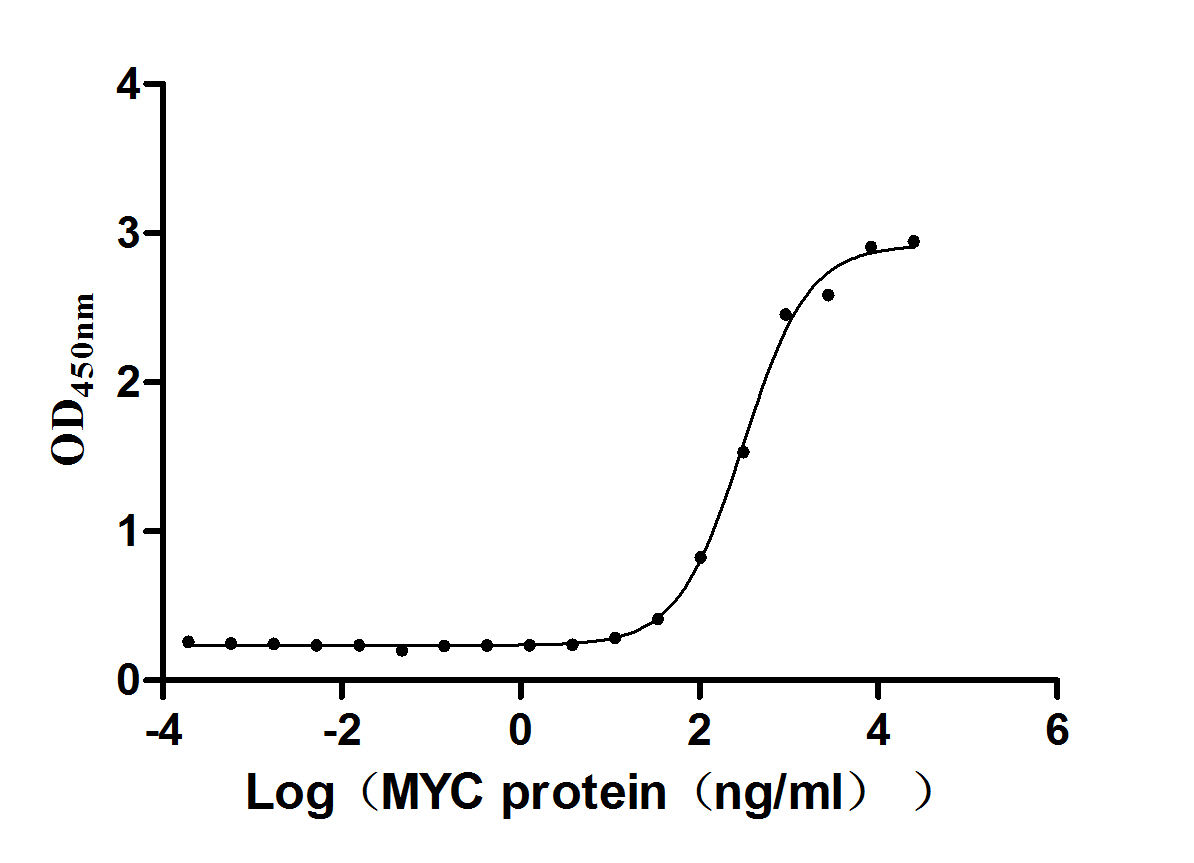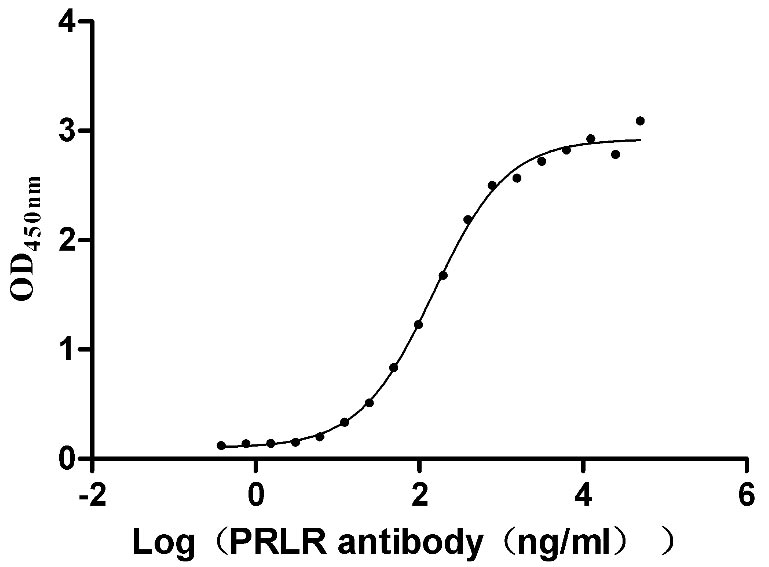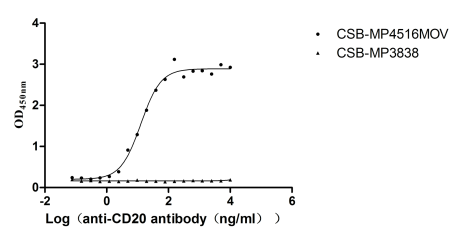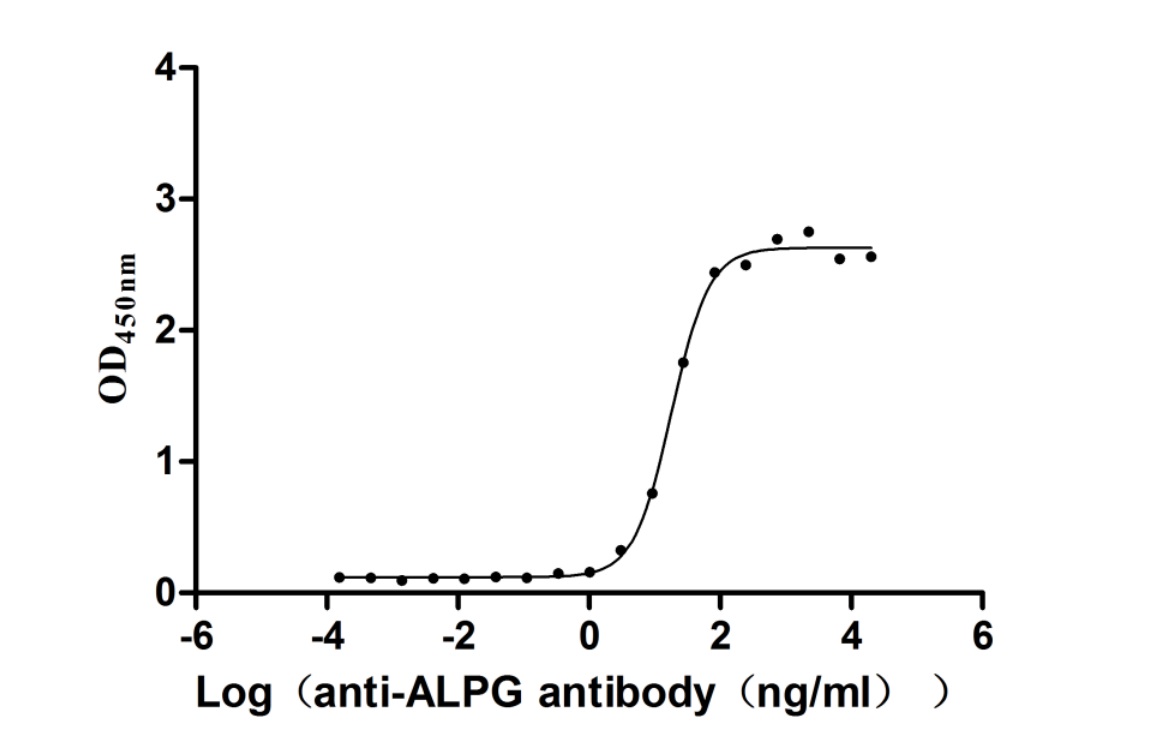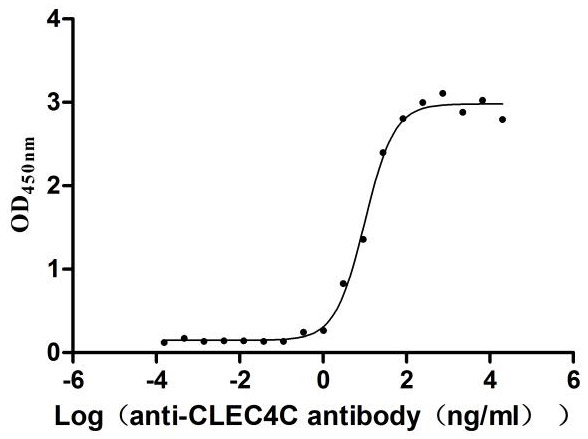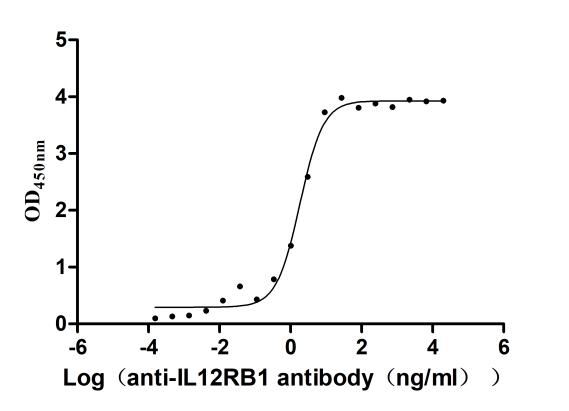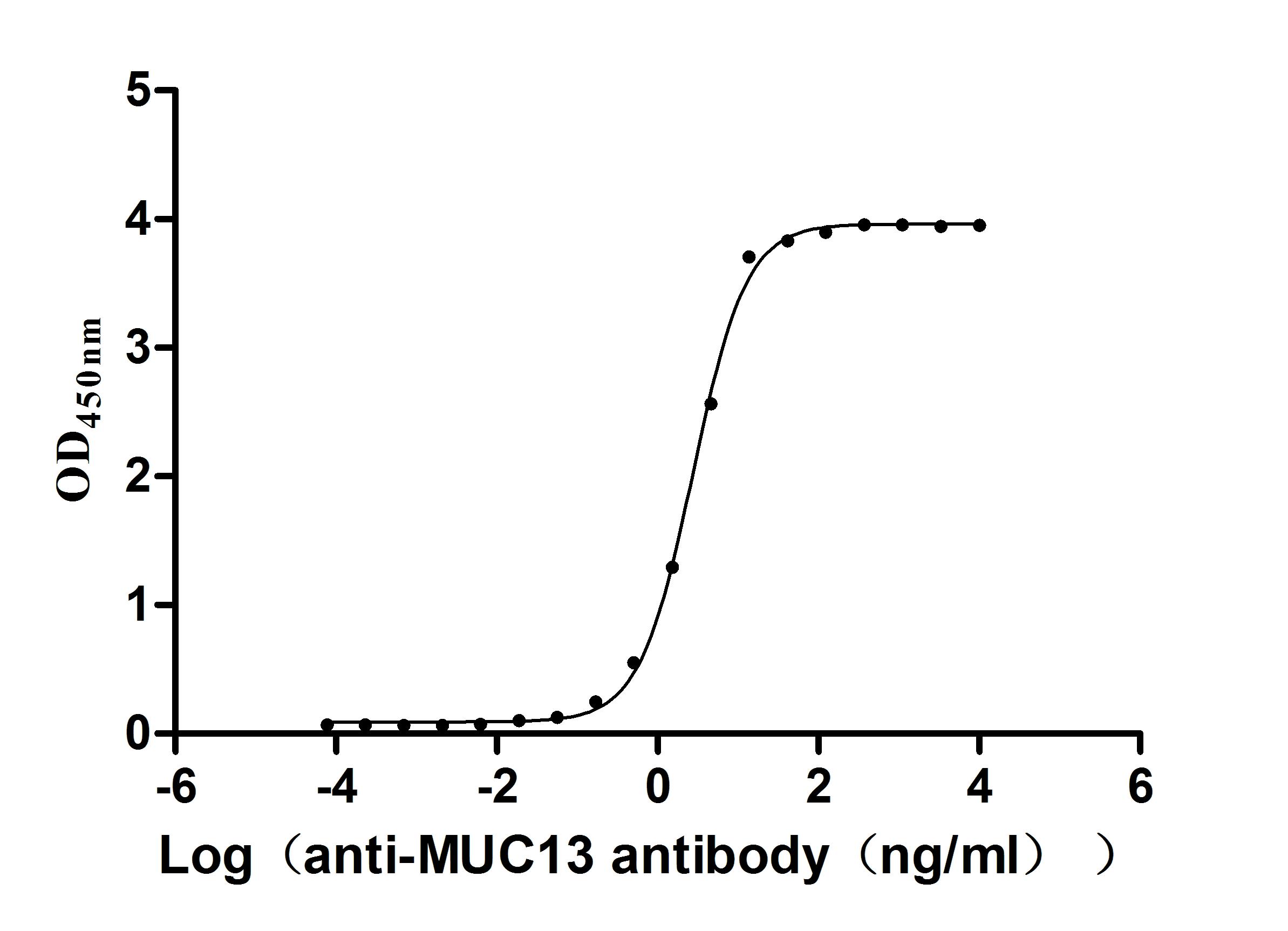Recombinant Mouse Estrogen receptor (Esr1)
-
货号:CSB-YP007830MO
-
规格:
-
来源:Yeast
-
其他:
-
货号:CSB-EP007830MO
-
规格:
-
来源:E.coli
-
其他:
-
货号:CSB-BP007830MO
-
规格:
-
来源:Baculovirus
-
其他:
-
货号:CSB-MP007830MO
-
规格:
-
来源:Mammalian cell
-
其他:
产品详情
-
纯度:>85% (SDS-PAGE)
-
基因名:
-
Uniprot No.:
-
别名:Esr1; Esr; Estr; Estra; Nr3a1; Estrogen receptor; ER; ER-alpha; Estradiol receptor; Nuclear receptor subfamily 3 group A member 1
-
种属:Mus musculus (Mouse)
-
蛋白长度:Full length protein
-
表达区域:1-599
-
氨基酸序列MTMTLHTKAS GMALLHQIQG NELEPLNRPQ LKMPMERALG EVYVDNSKPT VFNYPEGAAY EFNAAAAAAA AASAPVYGQS GIAYGPGSEA AAFSANSLGA FPQLNSVSPS PLMLLHPPPQ LSPFLHPHGQ QVPYYLENEP SAYAVRDTGP PAFYRSNSDN RRQNGRERLS SSNEKGNMIM ESAKETRYCA VCNDYASGYH YGVWSCEGCK AFFKRSIQGH NDYMCPATNQ CTIDKNRRKS CQACRLRKCY EVGMMKGGIR KDRRGGRMLK HKRQRDDLEG RNEMGASGDM RAANLWPSPL VIKHTKKNSP ALSLTADQMV SALLDAEPPM IYSEYDPSRP FSEASMMGLL TNLADRELVH MINWAKRVPG FGDLNLHDQV HLLECAWLEI LMIGLVWRSM EHPGKLLFAP NLLLDRNQGK CVEGMVEIFD MLLATSSRFR MMNLQGEEFV CLKSIILLNS GVYTFLSSTL KSLEEKDHIH RVLDKITDTL IHLMAKAGLT LQQQHRRLAQ LLLILSHIRH MSNKGMEHLY NMKCKNVVPL YDLLLEMLDA HRLHAPASRM GVPPEEPSQT QLATTSSTSA HSLQTYYIPP EAEGFPNTI
-
蛋白标签:Tag type will be determined during the manufacturing process.
The tag type will be determined during production process. If you have specified tag type, please tell us and we will develop the specified tag preferentially. -
产品提供形式:Lyophilized powder
Note: We will preferentially ship the format that we have in stock, however, if you have any special requirement for the format, please remark your requirement when placing the order, we will prepare according to your demand. -
复溶:We recommend that this vial be briefly centrifuged prior to opening to bring the contents to the bottom. Please reconstitute protein in deionized sterile water to a concentration of 0.1-1.0 mg/mL.We recommend to add 5-50% of glycerol (final concentration) and aliquot for long-term storage at -20℃/-80℃. Our default final concentration of glycerol is 50%. Customers could use it as reference.
-
储存条件:Store at -20°C/-80°C upon receipt, aliquoting is necessary for mutiple use. Avoid repeated freeze-thaw cycles.
-
保质期:The shelf life is related to many factors, storage state, buffer ingredients, storage temperature and the stability of the protein itself.
Generally, the shelf life of liquid form is 6 months at -20°C/-80°C. The shelf life of lyophilized form is 12 months at -20°C/-80°C. -
货期:Delivery time may differ from different purchasing way or location, please kindly consult your local distributors for specific delivery time.Note: All of our proteins are default shipped with normal blue ice packs, if you request to ship with dry ice, please communicate with us in advance and extra fees will be charged.
-
注意事项:Repeated freezing and thawing is not recommended. Store working aliquots at 4°C for up to one week.
-
Datasheet :Please contact us to get it.
相关产品
靶点详情
-
功能:Nuclear hormone receptor. The steroid hormones and their receptors are involved in the regulation of eukaryotic gene expression and affect cellular proliferation and differentiation in target tissues. Ligand-dependent nuclear transactivation involves either direct homodimer binding to a palindromic estrogen response element (ERE) sequence or association with other DNA-binding transcription factors, such as AP-1/c-Jun, c-Fos, ATF-2, Sp1 and Sp3, to mediate ERE-independent signaling. Ligand binding induces a conformational change allowing subsequent or combinatorial association with multiprotein coactivator complexes through LXXLL motifs of their respective components. Mutual transrepression occurs between the estrogen receptor (ER) and NF-kappa-B in a cell-type specific manner. Decreases NF-kappa-B DNA-binding activity and inhibits NF-kappa-B-mediated transcription from the IL6 promoter and displace RELA/p65 and associated coregulators from the promoter. Recruited to the NF-kappa-B response element of the CCL2 and IL8 promoters and can displace CREBBP. Present with NF-kappa-B components RELA/p65 and NFKB1/p50 on ERE sequences. Can also act synergistically with NF-kappa-B to activate transcription involving respective recruitment adjacent response elements; the function involves CREBBP. Can activate the transcriptional activity of TFF1. Also mediates membrane-initiated estrogen signaling involving various kinase cascades. Essential for MTA1-mediated transcriptional regulation of BRCA1 and BCAS3.
-
基因功能参考文献:
- The s identify estrogen receptor alpha (ERalpha) as the top regulator of pro-resilient transcriptional changes in the nucleus accumbens, a key brain reward region implicated in depression. PMID: 29549264
- ERalpha-signaling may be crucial for vibration-induced effects on fracture healing, whereas ERbeta-signaling may play a minor role PMID: 29367057
- hepatic Estradiol/ESR1 signaling plays a key role in the maintenance of gluconeogenesis and lipid metabolism in males. PMID: 28490809
- ESR1 inhibits chorionic gonadotropin-induced steroidogenesis and proliferation of progenitor Leydig cells in mice. PMID: 28266530
- suppresses breast cancer metastasis by regulating vinculin PMID: 28266545
- High ESR1 expression is associated with metastasis in breast Cancer. PMID: 29187405
- Study demonstrates an unexpected phenotype in high fat diet-fed estrogen receptor alpha (ERalpha) knockout mice involving severe uterine bacterial infections likely resulting from a previously unknown negative interference between dietary fatty acids and ERalpha-signaling during anti-microbial defence. PMID: 28233809
- study found that 27-HC promoted the growth of melanoma cells by activating ERalpha and eliciting the AKT and MAPK signaling pathway. PMID: 29130512
- By using mutant mice with liver-specific ablation of Eralpha, the s here demonstrate that the hepatic ERalpha is essential for the modulation of the activity of Agouti Related Protein (AgRP) neurons in relation to the reproductive cycle and diet. PMID: 28446774
- DNA methylation and transcriptome aberrations mediated by ERalpha in mouse seminal vesicles following developmental DES exposure. PMID: 29666266
- This novel transgenic mouse line will be a useful animal model for lineage-tracing Esr1-expressing cells, selective gene ablation in the Esr1-lineage cells and for generating global Esr1 knockout mice. PMID: 29115049
- Data (including data from studies in transgenic mice) suggest that Esr1 signaling promotes activation of Pp2a; here, central activation of Pp2a during estrogen replacement therapy is involved in prevention of menopause-induced obesity and glucose intolerance (that is, induced by lack of membrane-initiated Esr1 signaling). (Esr1 = estrogen receptor 1; Pp2a = protein phosphatase 2A) PMID: 29764860
- Results show that membrane initiated ERalpha signaling is important for the estrogen response in adult female mice in vivo in a tissue-dependent manner, and that membrane ERalpha signaling is crucial for the estrogen response in trabecular bone in the axial skeleton. PMID: 27388455
- Results show that ERalpha activation might constitute one of the neural substrate that is involved involved in the facilitative mechanisms to restore the sexual olfactory preferences of sexually naive Tph2-/- female mice. PMID: 29470551
- Study found that estrogen receptor alpha (ERalpha) was expressed in the motoneurons of lumbar ventral horn. ERalpha and ERbeta were mainly localized in the nuclei of motoneurons with less immunoreactivity in the cytoplasm. PMID: 28501695
- suggest miR-181a inhibition enhances E2-mediated stroke protection in females in part by augmenting ERalpha production PMID: 28522364
- nuclear Shp2, rather than cytosolic Shp2, promotes the ERalpha transcription activity. This function is achieved by enhancing the Src kinase-mediated ERalpha tyrosine phosphorylation, which facilitates ERalpha binding to Pgr promoter in an ERK-independent manner in periimplantation uteri. PMID: 28424251
- ERalpha masculinizes GABAergic neurons that gate the display of male-typical behaviors. PMID: 28734725
- The administration of ICI182,780, which is an agonist of G-protein coupled estrogen receptor (GPER) and an antagonist of ERa and ERb, did not result in protection; however, ICI182,780 significantly blocked EDC-mediated cardioprotection, indicating participation of ERalpha and/or ERbeta PMID: 28457941
- Data (including data from studies using knockout mice) suggest that early initiation of endometriosis is predominantly dependent on immune system; cross-talk occurs between Esr1 and Il6 pathways during early initiation of endometriosis lesion development; estradiol stimulation of Esr1 appears to play minor role in early lesion development. (Esr1 = estrogen receptor alpha; Il6 = interleukin 6) PMID: 28927243
- Studies indicate that lack of estrogen receptor alpha (ERalpha) in osteoblast progenitor and precursor cells generally affects the periosteum of female and male mice. PMID: 29148577
- extra-nuclear estrogen signaling affects cortical bone mass in males, and this effect is dependent on a functional ERalphaAF-1. PMID: 28057769
- Transgenic mouse line expressing the human Ki-Ras bearing an activating mutation (Ki-Ras((G12V))) selectively in the mammary epithelium develop estrogen receptor alpha (ERalpha)-positive ductal adenocarcinomas with 100% incidence within 3-9 months after Ki-Ras((G12V)) induction. PMID: 28745321
- mouse mammary ER(+) and ER(-) luminal cells are two independent lineages that are maintained by distinct stem cells, providing a revised mammary epithelial cell hierarchy. PMID: 28329676
- Lupus-prone ERalpha -/- mice are not protected from lupus disease expression if ovariectomized. PMID: 28822833
- Taken together, the above results clearly demonstrated an mTORC2-dependent regulation of actin polymerization that contributed to the effects of ERalpha and ERbeta on spatial learning, which may provide a novel target for the prevention and treatment of E2-related dementia in the aged population PMID: 28789972
- These findings suggest that RASD1 acts as a novel signaling molecule and plays an important role in regulating dynamic uterine remodeling during the estrous cycle in the uterus. PMID: 28188843
- Truncating mutations of Prlr promote tumor growth in a model of human ERalpha+ breast cancer. PMID: 27681435
- This comparative study documented the complexity of ERalpha genes, mRNAs, and proteins, and further determined the underlying structural basis of ligand-independent activation by C-terminally-truncated ERalpha variants. PMID: 28412386
- E2-ERs system was functional in maintaining oocyte meiotic arrest by regulating the expression of natriuretic peptide C and natriuretic peptide receptor 2 (NPPC/NPR2) PMID: 28277543
- Ventromedial hypothalamus neurons expressing Esr1 are indispensable for female aggression. PMID: 28920934
- Increased DNA methylation accompanied this pattern, particularly at CpG dinucleotides located within binding or flanking regions for the transcriptional regulator CCCTC-binding factor of ESR1 and ESR2, consistent with sustained transcriptional activation of ERa and ERb PMID: 28373182
- Ciliary length and beat frequency of the oviductal epithelial cells are regulated through ESR1. PMID: 28082352
- Loss of endothelial ERalpha reduces vascular stiffness in male mice fed a Western Diet with an associated outward hypertrophic remodeling of resistance arteries. PMID: 28430983
- results also suggest that, in the presence of adult endogenous steroid levels, ERalpha36 overexpression in vivo contributes to alter mammary gland architecture which may support pre-neoplastic lesion and augment breast cancer risk PMID: 28301550
- Activation of HIF1A by prolonged in vivo hyperinsulinemia potentiates cancerous progression in estrogen receptor-positive breast cancer cells. PMID: 28351619
- Gene-environment interactions driven by early life xenoestrogen exposure likely contributes to increased risk of estrogen-related disease in adults. PMID: 27312807
- activation in the medial amygdala during the pubertal period is crucial for male mice to fully express their male-type social behaviors in adulthood PMID: 27325769
- Data suggest that prenatal exposure to p,p'-DDT (an endocrine disrupting pesticide) causes sex- and age-independent attenuation of Esr1 in brain which may be involved in propagation of DDT-induced depressive-like neurotoxicity. PMID: 28263910
- Here, the s demonstrate that mature miRNA-22 is more abundant in muscle from male mice relative to females and that this enables sex-specific regulation of muscular lipid metabolism and body weight by repressing estrogen receptor alpha (ERalpha) expression. PMID: 28314781
- Estrogen response element-independent regulation in the arcuate nucleus is mainly mediated by tethering of ERalpha. PMID: 28359086
- ERalpha acts in a B cell-intrinsic manner to control B cell activation, autoantibody production, and lupus nephritis PMID: 27989899
- These findings identify a previously unknown role for membrane ESR1 in the development of normal sperm and providing an adequate environment for spermatogenesis. PMID: 27145009
- The present results showed that ER knockout alpha and beta male mice had lower striatal mGlu5 receptor binding and protein measured by Western blot. PMID: 26873133
- However, the SERMs had slightly different effects on the appendicular skeleton since only Las increased the trabecular bone mass and only Ral increased the cortical porosity. Importantly, all SERM effects require a functional ERalphaAF-1 in female mice. These results could lead to development of more specific treatments for osteoporosis. PMID: 27048997
- Kiss1 in the medial amygdala is regulated primarily by estrogen receptor alpha, and not estrogen receptor beta. PMID: 27564649
- The balance between inhibitory effects of central ERalpha activity in hypothalamic POMC neurons in arcuate nucleus of the hypothalamus and stimulatory peripheral ERalpha-mediated effects in bone determines cortical bone mass in female mice. PMID: 27254004
- we found that post-ejaculated semen from fertile wild-type males was solidified and the sperm were entrapped in Wnt7aCre/+;Esr1f/f uteri, compared to the watery semen (liquefied) found in Esr1f/f controls.Kallikrein-related peptidases 3 (KLK3) and other kallikrein-related peptidases from male prostate glands are responsible for semen liquefaction by cleaving gel-forming proteins PMID: 28414719
- we showed that, in the absence of ERalpha, G93A-SOD1 failed to activate OMI and the proteasome, confirming the ERalpha dependence of the response. Taken together, these results demonstrate the IMS-UPRmt activation in SOD1 familial Amyotrophic lateral sclerosis , and suggest that sex differences in the disease phenotype could be linked to differential activation of the ERa axis of the IMS-UPRmt PMID: 28186560
- Here we describe the generation of a gene-targeted mouse line that enables CRE-inducible expression of a conditionally-active fusion between the ROCK2 kinase domain and the hormone-binding domain of a mutated estrogen receptor (ROCK2:ER). This two-stage system of regulation allows for tissue-selective expression of the ROCK2:ER fusion protein, which then requires administration of estrogen analogues PMID: 27775859
显示更多
收起更多
-
亚细胞定位:Nucleus. Cytoplasm. Golgi apparatus. Cell membrane.
-
蛋白家族:Nuclear hormone receptor family, NR3 subfamily
-
数据库链接:
KEGG: mmu:13982
STRING: 10090.ENSMUSP00000070070
UniGene: Mm.463262
Most popular with customers
-
Recombinant Human papillomavirus type 16 Protein E7 (E7) (Active)
Express system: E.coli
Species: Human papillomavirus type 16
-
Recombinant Human Prolactin receptor (PRLR), partial (Active)
Express system: Mammalian cell
Species: Homo sapiens (Human)
-
Recombinant Macaca fascicularis Membrane spanning 4-domains A1 (MS4A1)-VLPs (Active)
Express system: Mammalian cell
Species: Macaca fascicularis (Crab-eating macaque) (Cynomolgus monkey)
-
Recombinant Human Alkaline phosphatase, germ cell type (ALPG) (Active)
Express system: Mammalian cell
Species: Homo sapiens (Human)
-
Recombinant Human C-type lectin domain family 4 member C (CLEC4C), partial (Active)
Express system: Mammalian cell
Species: Homo sapiens (Human)
-
Recombinant Human Interleukin-12 receptor subunit beta-1(IL12RB1),partial (Active)
Express system: Mammalian cell
Species: Homo sapiens (Human)
-
Recombinant Human Mucin-13(MUC13),partial (Active)
Express system: yeast
Species: Homo sapiens (Human)


